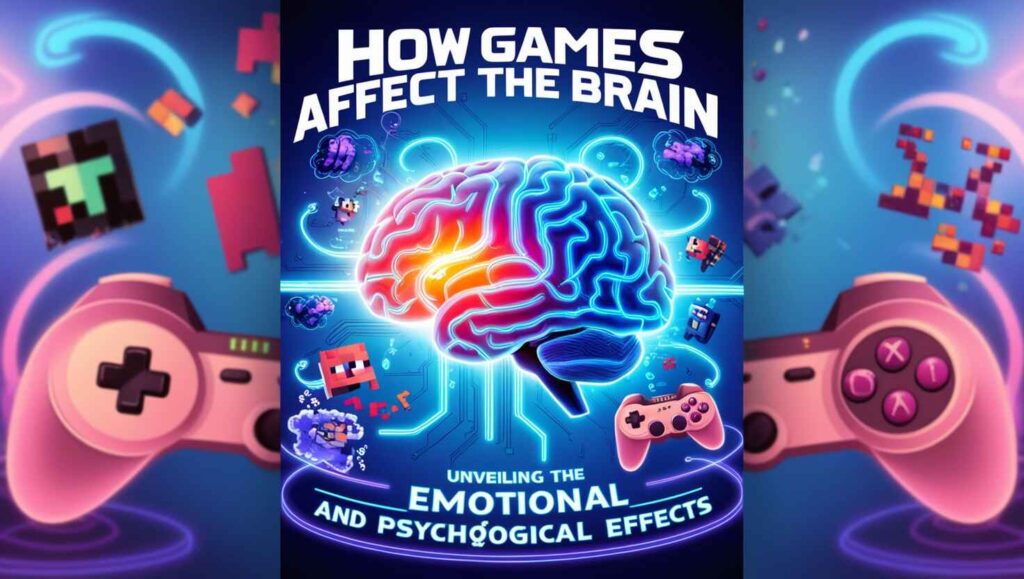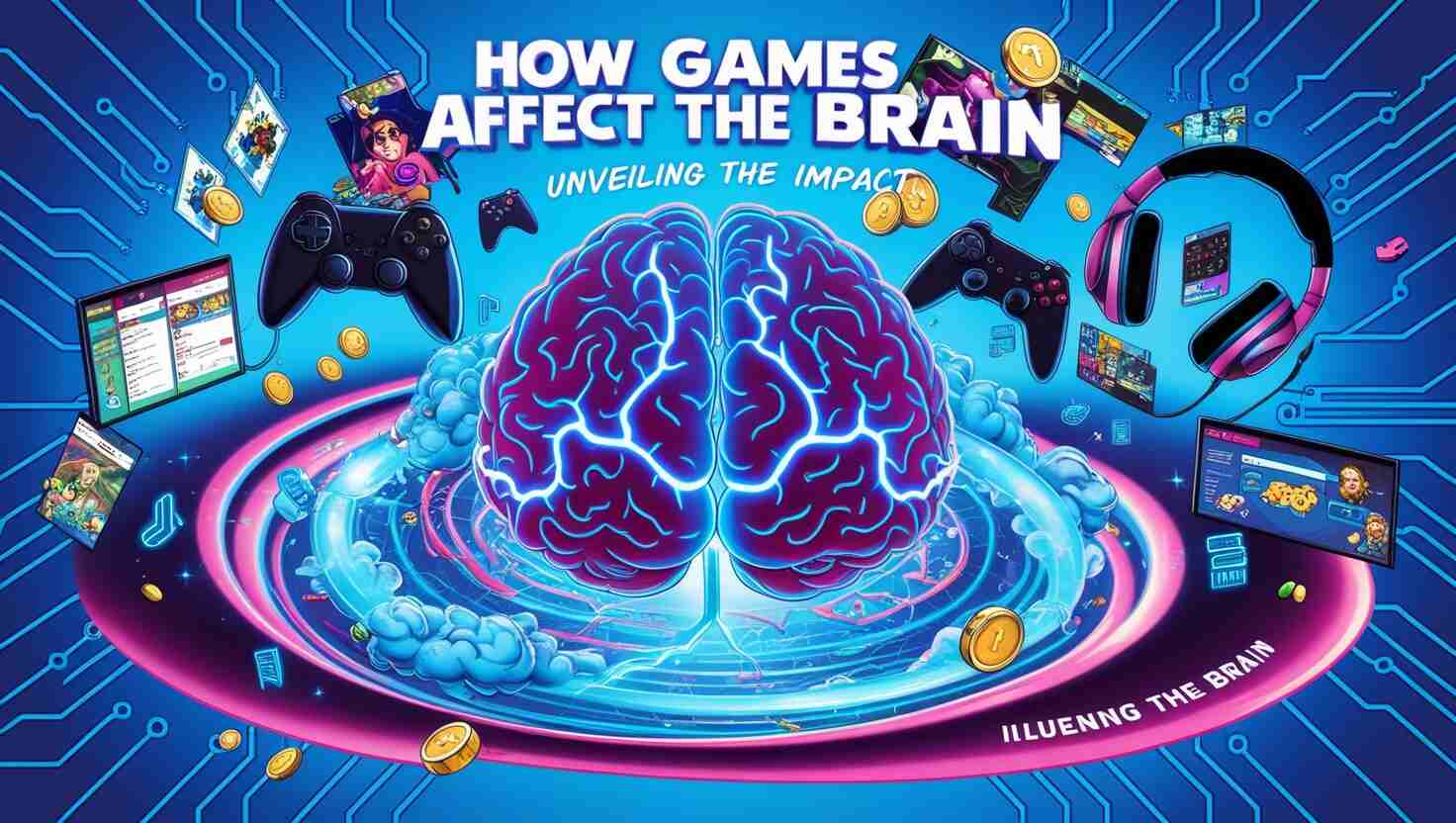How Games Affect the Brain In recent times, video games have changed from simple entertainment pastimes to extremely complex and involving experiences for hundreds of millions across the globe. Critics tend to associate video game use with problems like addiction and aggression, whereas research now documents its impact as multifaceted. Video games enhance cognition while regulating emotions through profound and multifaceted influences. This article will discuss how video games impact the brain, pointing out the benefits and negative aspects of gaming.
Cognitive Benefits of Gaming
Enhanced Problem-Solving Ability
Video games often demand the solving of puzzles, strategizing, and fast decision-making. These activities help stimulate critical thinking and enhance problem-solving abilities. For instance, strategy games like Civilization or puzzle games like Portal require the player to think ahead several steps and adapt to unexpected challenges, thereby increasing their cognitive flexibility.
Enhanced spatial awareness
Action and adventure games, particularly those that require a player to move through intricate landscapes, significantly improve spatial reasoning. A study in the journal Nature found that playing 3D games such as Super Mario increased hippocampal gray matter, a region related to spatial memory.
Enhanced multitasking and attention
Multi-player fast-paced games like Call of Duty or Overwatch train players in multitasking where they can trace enemies, keep resources protected, and coordinate with teammates. Multitasking capabilities are more beneficial in real-world applications by making task switching effective and attention-span longer.
Enhanced memory retention
Most games require the player to remember all the rules, objectives, and character traits, which contributes to both short-term and long-term memory. Games specifically developed for the children have been of significant success in developing recall as well as comprehension skills.
Emotional and Psychological Effects

Relief from Stress
Gaming can be used as a relief mechanism from the everyday causes of stress. For example, games like Animal Crossing or Stardew Valley create a healthy atmosphere that enables the player to relax and wind off.
More Emotional Empathy: Story-based Games
Games, such as The Last of Us or Life is Strange, where stories are deeply emotive and can make the gamer make morally demanding choices. Through this, there is an improvement in empathy, as one would experience the situation from other perspectives.
Social Attachment
Multiplayer games require a lot of cooperation, communication, and teamwork that can strengthen bonds socially. One can use it as a space to meet in Minecraft, Among Us, and Fortnite, with which friendships develop and communities start building.
Potential for Addiction
Although gaming has various psychological benefits, excessive gaming can lead to an addiction of compulsive behavior and loss of control. It can lead to a negative impact on mental health, including problems such as anxiety, depression, or social isolation.
Neural plasticity and brain development
How Games Affect the Brain Video games enhance neuroplasticity, or in other words, improve the reorganisation of the brain by the establishment of new connections between its constituent neurons. These activities boost neural connectivity and in particular in most regions in regards to decision making memory and sensory/motor coordination between children and the adolescents provided a balance between them.
Educational and therapeutic applications
Gamification in education
Educational games utilize the entertaining aspects of gaming to teach subjects like math, science, and history. Kahoot! and Prodigy are examples of platforms that make learning interactive and fun, hence increasing student engagement and retention.
Rehabilitation and therapy
How Games Affect the Brain Video games are used increasingly in treatment to help with rehabilitation in the case of patients with strokes or for enhancing their motor skills to deal with various disorders like ADHD. For instance, video games involving physical participation, such as Nintendo Wii games, can enhance a patient’s ability to be mobile and balanced.
Mental health interventions
Games that cater to mental issues, like SPARX – a game utilized in the therapy of depression. Such games use entertainment as well as psychological principles like CBT for therapeutic approaches.
The Dark Side of Gaming
Gaming offers many benefits. However, these are not all positive. Here are some adverse effects of the excessive or improper content in it:
Desensitization to Violence
Some research indicates that violent games exposure diminishes sensitivity to real violence, although the findings are mixed and debated.
Sleep Disturbance
Long hours of gaming, especially at night, can interfere with sleep because blue light emission increases emotional arousal.
Physical Health Issues
Extended periods of sedentary gaming can cause health issues like obesity, poor posture, or repetitive strain injuries. Breaks and encouraging activity will reduce the risk.
Cyberbullying and online harassment
Players can be exposed to toxic behavior, such as cyberbullying and harassment, through multiplayer games, which may impact mental health.
Balancing the Fun
To benefit from gaming and minimize its risks, consider the following tips:
Set boundaries.
Set clear limits on the amount of time spent playing games to prevent interference with other responsibilities or their physical health.
Select appropriate age content.
Monitor the kind of games played and their suitability to the maturity of the child.
Promote social and physical activities
Ensure gaming is balanced by outdoor games, social life, and other leisure activities that are necessary for well-rounded development.
Monitor screen time
Set a limit on screen time, especially in the evening hours, so it does not disrupt sleep patterns.
The Future of Gaming and Brain Research
As technology improves, the gaming world will evolve as well and may offer much more immersive and interactive experiences. Even virtual reality and augmented reality games have been applied in various education and therapy exercises. Research that will definitely unlock the complicated interactions between games and the brain, paving the way for the many applications it might have by working on the strengths of this gaming world and facing its challenges.
Conclusion
On one hand, How Games Affect the Brain playing video games may have a strong impact on the brain, delivering a mix of cognitive, emotional, and social benefits along with potential risks. Understanding these effects and adopting mindful gaming habits enables players to maximize the positive outcomes and minimize the adverse ones. This is fascinating, yet profound, as society accepts gaming as part of its cultural and educational framework.
Also read Why Games Are Important for Students: Unlocking the Power
